A Girl’s War: A Childhood Lost, Part 2 of 2
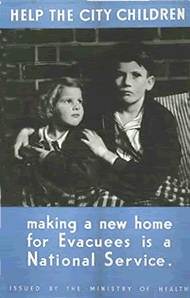
- SUBSCRIBE
- ALREADY SUBSCRIBED?
BECOME A BONJOUR PARIS MEMBER
Gain full access to our collection of over 5,000 articles and bring the City of Light into your life. Just 60 USD per year.
Find out why you should become a member here.
Sign in
Fill in your credentials below.
 In Part I of her story (published on June 28), Doreen Lehr shared her compelling story of a childhood lost. At the start of World War II, millions of desperate European and British parents sent their children alone to live in safer places away from war. Doreen Lehr was a three-year-old British tot sent away as a Operation Pied Piper evacuee, separated from her family for six years. Here she continues A Girl’s War, a BonjourParis exclusive.
In Part I of her story (published on June 28), Doreen Lehr shared her compelling story of a childhood lost. At the start of World War II, millions of desperate European and British parents sent their children alone to live in safer places away from war. Doreen Lehr was a three-year-old British tot sent away as a Operation Pied Piper evacuee, separated from her family for six years. Here she continues A Girl’s War, a BonjourParis exclusive.
The catalyst for the book presented itself when I attended a Drug Awareness Seminar in the German countryside in the early 1970s. A Transcendental Meditation group leader posed the question, “What do you remember about World War II?” A US Air Force chaplain commented with a cheery grin, “It was something I read about in the newspapers.”
“WWII was not something I read about in the newspapers,” I managed to say before becoming visibly distressed.
From that time forward, I began a quest to find out what had affected me so violently. In the late 1970s, after I had begun gathering information my mother and my only brother died. Then, I believed it would be impossible to obtain further facts about my childhood as a WWII evacuee.
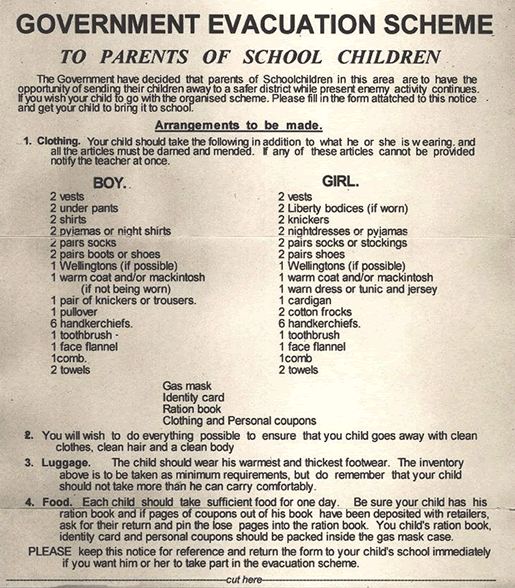
In 1997, I put an advertisement in the Yorkshire Post newspaper and three former teachers from the Linton Camp Residential School, Frank Newbould, Ailsa Williams, and Winifred Lowcock, responded. These octogenarian educators had not seen one another since German bombs were falling on Britain, ration books were a requirement, people regularly spent time in air-raid shelters, and they were all in their 20s. These wonderful individuals, now in their mid-to-late 80s, together with some former students helped me to weave the story of my lost childhood.
The research for the book was not easy on any level. It took more than 20 years for me to reach a place where I could speak about my childhood experience, and many more years before I could write about the things I had discovered. It is difficult to shine a light on a past you have spent a lifetime forgetting. Dr. Martin Parsons, Director, Evacuation and War Studies Centre, University of Reading, frequently mentions how many former evacuees still cannot talk about their experiences.
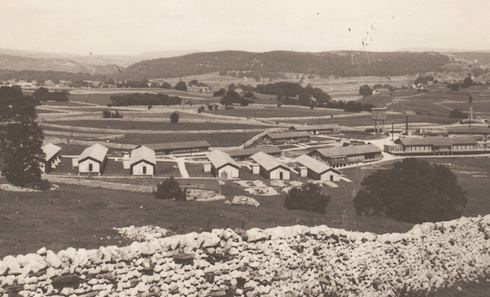
Once WWII ended in 1945, no one talked about the war or the evacuation. The government that had taken years to prepare for the evacuation ignored the warnings of leading child psychologists that these children would need care after the war ended. The government did not collect data to discover the effects on the child evacuees. British children did not learn about the evacuation, nor, until the last two decades, was Operation Pied Piper mentioned in WWII literature. In today’s culture, each child would have a counselor to help them make sense of their experience. In 1945, these former evacuees received no help. The attitude of war weary post-war Britain: “The war is over; get on with your lives.”
Today, British parents adamantly state that they would never let their children go alone to live with strangers and question how evacuee parents could have been so heartless. It is easy to judge societal behavior through the prism of hindsight and an era of heightened awareness. We cannot, nor should we, judge Second World War parents through the lens of Britain’s welfare state that now provides from the cradle to the grave. When Britons today say how awful those wartime parents were to send their children away, they clearly have no understanding of the political and social conditions of 1930s and ‘40s, and, of a country at war.
Contemporary parents do not fear they will go hungry if they cannot work. They have numerous social programs to protect them if they lose their jobs. Given the lack of communication and the difficulty of their decisions, we should congratulate rather than condemn these wartime parents for their sacrifices and for their courage.
The primary question former evacuees still ask is, “Why did my parents send me away.” One aim of A Girl’s War is to help former evacuees to understand that their parents, like mine, believed they were sending their children away for their own protection. Also, as children they were not to blame for those separations and that the effects of the evacuation can last a lifetime.
About the Author:
Doreen Drewry Lehr, Ph.D. has written articles for magazines and journals, but this is her first book. She married Wayne R. Lehr, a US Air Force Officer in 1961 and traveled extensively throughout the world. Dr. Lehr taught at Springfield College in Manchester, New Hampshire, and at Western Michigan University. A Gold Star Wife, she lives in Washington D.C. and Key West, Florida. Doreen is also a Francophile who will spend two months in Uzès in the autumn. Check her website to read more about this book.
Not yet subscribed to BonjourParis? Sign up for your free subscription & we’ll send you 50 original stories every month from your most complete online France travel & Francophile lifestyle eZine. RSS or email.
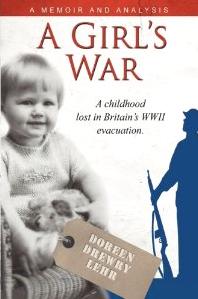 A GIRL’S WAR: A CHILDHOOD LOST IN BRITAIN’S WWII EVACUATION is a courageous narrative that includes a fascinating probe into the decisions of a country at war. Great Britain intentionally displaced the nation’s children, the very future of the country, with little regard for the damage it would cause those evacuees. A GIRL’S WAR is a long overdue account of an extraordinarily poorly conceived plan and a compelling memoir.
A GIRL’S WAR: A CHILDHOOD LOST IN BRITAIN’S WWII EVACUATION is a courageous narrative that includes a fascinating probe into the decisions of a country at war. Great Britain intentionally displaced the nation’s children, the very future of the country, with little regard for the damage it would cause those evacuees. A GIRL’S WAR is a long overdue account of an extraordinarily poorly conceived plan and a compelling memoir.
“This is an excellent book primarily because of its honesty…This will certainly go on my students’ reading list.”
–Dr. Martin Parsons, Director of Research Centre for Evacuee and War Child Studies, University of Reading
Cynthia Enloe, author of Nimo’s War, Emma’s War: Making Feminist Sense of the Iraq War, stated, “Doreen Lehr has been brave enough—and smart enough—to raise the heavy curtain on a British girl’s wrenching wartime experiences. A Girl’s War makes so clear that in any survivor’s life, “post-war” can last a long time.
Did you know you can buy travelers’ essentials like luggage, guidebooks, cameras plus imported gifts for Francophiles at our BonjourParis Amazon.com Boutique? You benefit from competitive pricing and speedy delivery as your purchases support costs of keeping BonjourParis your most complete online France travel resource. Merci in advance for your support.
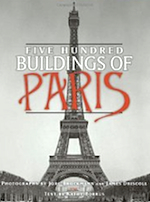 Five Hundred Buildings of Paris contains photographs and neighborhood tours of the greatest buildings and monuments in Paris. Information includes the building’s name, location, year of completion or renovation and historical highlights. Order Five Hundred Buildings of Paris [Sept 2010 release] at our amazon.com French Marketplace.
Five Hundred Buildings of Paris contains photographs and neighborhood tours of the greatest buildings and monuments in Paris. Information includes the building’s name, location, year of completion or renovation and historical highlights. Order Five Hundred Buildings of Paris [Sept 2010 release] at our amazon.com French Marketplace.

One-stop shopping for air, hotel & car rental deals:
To rent a car with a 5% discount for BonjourParis.com readers, click Auto Europe Car Rental
To rent a hotel, click Auto Europe Hotels
To buy international flights, click Auto Europe Flights


